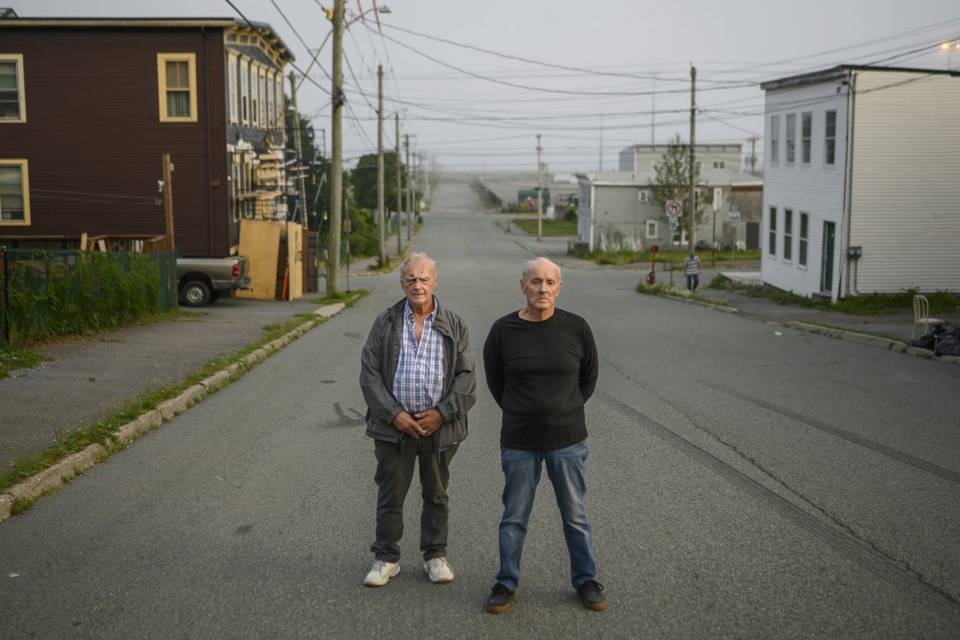FREDERICTON — An external review of police conduct around the wrongful murder convictions of two New Brunswick men has been completed, but the civilian board that oversees the Saint John, N.B., police force says privacy concerns need to be addressed before it can me made public.
Tamara Kelly, chairwoman of the city's Board of Police Commissioners, acknowledged the report has taken time. Police Chief Robert Bruce ordered the "comprehensive review" in January 2024 after a court exonerated Robert Mailman and Walter Gillespie of a 1983 murder they did not commit. Mailman spent 18 years in prison for the crime and Gillespie served 21 years.
Kelly said in an interview last week that the review by retired RCMP officer Allen Farrah was complicated by the length of time since the murder investigation.
"A lot of people are not around from that time," she said. "So, you know, to make sure that it was done well, they did what they had to do."
Now, she said, Bruce is reviewing the report to ensure protected information is not divulged. "There could be things in there ... whether it's identifiable information or any of that sort of stuff," she said.
On Jan. 4, 2024, New Brunswick Court of King’s Bench Chief Justice Tracey DeWare ruled that Mailman and Gillespie had been victims of a miscarriage of justice. That came after federal Justice Minister Arif Virani ordered a new trial, citing evidence that called into question “the overall fairness” of their prosecution.
A submission to the court by Innocence Canada in January 2024 alleged the convictions had been the result of “police tunnel vision, non-disclosure of important evidence, recantations by the two key Crown witnesses,” as well as a disregard for the men’s strong alibis. Innocence Canada led the legal fight to exonerate the two men.
The document noted that Saint John police had given a total of $1,800 — in addition to hotel and relocation costs — to a 16-year-old who testified in 1984 that he had witnessed the murder of George Leeman in Saint John. The payments were not disclosed during the trial. The witness later recanted his story to his own lawyer, to a journalist, in two letters and to a federal Justice Department lawyer looking into Mailman and Gillespie's case in 1998.
Gillespie, who died last year, alleged he was told to sign a "false confession" saying Mailman killed Leeman. If he refused to sign the confession, he said, the Saint John police told him he would be sent to jail for life.
Kim Pate, a Canadian senator and a longtime advocate for justice reform, said there are examples of former police officers who have done "incredible" investigations of police misconduct. But she said in terms of public perception, the idea of police investigating themselves raises questions of transparency and accountability.
She questioned what privacy concerns could delay the report's release "Privacy of whom, I would want to know," Pate said. "And why is there a protection in place .... I think the public and obviously the wrongfully convicted have a right to know."
Patrick Watson, an assistant professor at University of Toronto's centre for criminology and sociolegal studies, said Innocence Canada and Gillespie alleged "very, very serious offences" by the police, and it is crucial that the review either confirms or rejects them.
"I don't know what else there is to be known about that, except who these officers were, are any of them still alive and should they be criminally charged?" he said. Names and ages of police officers are usually excluded from such reports, except in cases where officers are criminally charged, he added.
"I think that's going to be an issue for the investigation, to decide whether or not there's a public interest in charging any of these officers with an offence like obstruction, because there is this issue of time, and whether or not they are still alive."
Watson hopes the review will acknowledge the police wrongdoing and that police will apologize to the families involved.
"It's a real compounding tragedy," he said. "I've always been very curious about why official organizations, like state organizations in our society, are so reluctant to apologize for what has now been recognized by a court as blatant misconduct."
The fact that Leeman's family has no closure and may never know who killed him is "atrocious," Pate said.
"Wrongful convictions harm not just the people who are wrongfully accused and convicted and jailed, but also the families who are left behind with no answers (about) what happened to their loved one."
This report by The Canadian Press was first published Feb. 24, 2025.
Hina Alam, The Canadian Press




